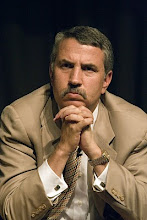Arthur S. Brisbane, the most timid in a long line of timid New York Times public editors, is having an existential crisis. Brisbane is supposed to be The Times’ “readers' representative . . . who responds to complaints and comments from the public and monitors the paper's journalistic practices.” Brisbane has sailed through his first 18 months on the job, but now one of those pesky readers he’s supposed to be representing has asked him a real stumper.
Shouldn’t the Times, a reader emails, point out when the subject of a story is lying rather than just dutifully passing along those lies? The idea that a reporter should challenge the falsehoods of the powerful is so foreign and radical to Brisbane, whose been working in the newspaper business since 1976, that he doesn’t even have a word in his vocabulary (“fact-checking!” “reporting!” “journalism!”) to describe it. So he settles on the most straight-forward, rolling-off-the-tongue phrase he can think of: “truth vigilantism.”
In a provocative piece entitled, “Should The Times Be a Truth Vigilante?” Brisbane asks what reporters should do if, say, Mitt Romney excoriates President Obama for “apologizing for America” when, in fact, the President has done no such thing? (Turns out the Prez is just fine with America being the world’s most destructive force.) Should the Times point that Romney’s pants are on fire or just what Mitt said? There are, Brisbane notes, “some readers who, fed up with the distortions and evasions that are common in public life, look to The Times to set the record straight.” Of course, it’s not just the distortions and evasions in public life that readers are fed up with; it’s also the distortions and evasions in The Times. And framing it as a question of "setting the record straight" ignores the fact that The Times isn't just reporting what the liars say; it's amplifying those lies.
Regardless, it’s a pretty remarkable piece that deserves to be read in its entirety, though preferably not while drinking a hot coffee or anything else that might damage your nasal passages. And Brisbane’s musings have already made quite a difference. For one, through sheer stupidity, Brisbane may have accidentally done more to draw attention to the fact that many of The Times “reporters” are mere stenographers than his three predecessors combined. And it’s propelled Brisbane from the guy no one knew existed to an Internet joke in just a few hours.
But alas, despite the fact that the 265 comments on Brisbane’s article all advocate for actual reporting, I predict that the only lasting result at The Times will be that Brisbane won’t be Public Editor much longer. Don’t cry for Arthur, though. I’m sure he’ll land a nice cushy job at teaching in the Truth Vigilante department at some prestigious university . . .
.jpg)